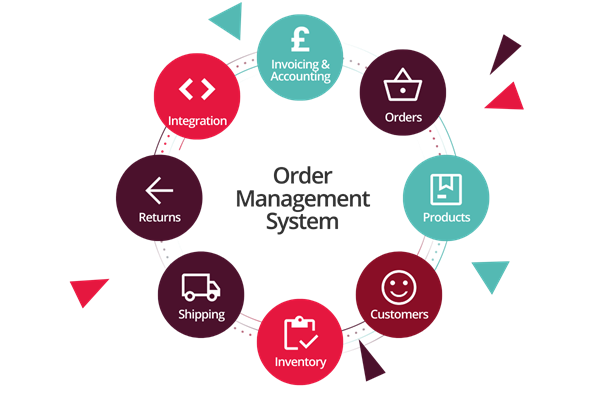Order management serves as the backbone of modern business operations, facilitating the smooth flow of products and services from purchase to delivery. Selecting the most suitable order management software is akin to finding the perfect balance in a complex equation. However, with numerous options available, it’s hard to navigate the vast array of choices.
We will tell you about the peculiarities and importance of solid OMS solutions. With this knowledge, you will make a sound decision when choosing an efficient platform.
OMS solutions in a nutshell
In the world of business operations, an OMS emerges as a powerful ally, offering organization and automation for key aspects of the purchasing and fulfillment processes. Once a purchase is complete and a shipping method is picked, an automated system is set off to guarantee timely completion. Such platforms secure orders are carried out efficiently by optimizing shipping routes according to cost and distance.
In addition, an OMS can help keep track of inventory levels, reducing the chances of running out of stock or backorders. It can also help with other parts of the customer lifecycle, like making returns simpler. An OMS creates visibility and encourages a simple process by enabling staff and customers to monitor and review every stage from beginning to end. Furthermore, it provides insights into the total process efficiency, allowing for review and development.
The best order management software platforms have the capacity to give retailers and distributors fulfillment reports and valuable information. With the help of these platforms, it is possible to track KPIs like fill time, fulfillment cost, and product defect and return rates. Monitoring these metrics helps managers to identify areas that need improvement and develop plans to fix them.
The variety of applications is striking. You can browse various top rankings to select an OMS that suits your goals the most. In 2023, Oracle, SAP, and Zoho Inventory are still the best products.
The importance of selecting the right application
Order management system software significantly enhances your operations, automates vital tasks, and boosts efficiency. By streamlining processes that were once reliant on manual involvement, it propels your ability to process everything swiftly and effectively. This will bring about higher customer satisfaction and strengthen your cash flow and profitability.
This software ensures customer satisfaction by providing them with a flexible ordering, pickup, delivery, and return system. An OMS ensures you can cater to the different requirements of customers, securing a smooth and personalized experience throughout their journey.
An OMS brings numerous benefits to the forefront. The versatility of such a platform allows you to navigate complex logistics effortlessly, optimizing operations and minimizing costs.
An additional advantage of an OMS lies in its scalability, aligning with your company’s growth trajectory. When sales increase and new ways to market products appear, a dependable platform can adjust to fit these changes and guarantee that your procedures remain efficient and successful.
Crucial insights for picking the best order management system
Selecting the proper platform is a critical choice for your company. To navigate this process effectively, we will explore four key considerations, industry best practices, and practical tips. They will help you pick the product that best meets your business requirements.
Clarify your business objectives and aspirations
When choosing the best order management system for your individual purposes, define your business requirements and goals with clarity. By understanding your unique needs and objectives, you can align them with the features and capabilities offered by different products.
Start by assessing your current processes and identifying pain points or areas that require improvement. Take into account volume, the complexity of inventory management, integration demands, and customer desires. Through this analysis, you can discern essential functionalities and features for your business.
Next, establish clear goals for your operations. Are you aiming to streamline processes, improve accuracy, enhance inventory visibility, or expand into new sales channels? Defining your goals will provide a framework for evaluating digital platforms and ensure that the chosen product aligns with your long-term vision.
Engage stakeholders across your organization, including operations, IT, customer service, and finance, to gather their perspectives and insights. Their thoughts will contribute to a full understanding of your business objectives and aims.
Assess scalability and flexibility
When searching for the best OMS, assess its scalability and flexibility to ensure it can adapt and grow with your company. As your operations expand, your platform should have the capacity to handle increased order volume, additional sales channels, and growing customer demands.
Consider the scalability in terms of both performance and capacity. Evaluate the ability of a platform to handle a higher number of operations without compromising speed or efficiency. Look for features such as load balancing, caching mechanisms, and robust infrastructure that can support your future growth.
Flexibility is equally important. Your business may need to add new sales channels, redesign workflows, or modify your fulfillment processes as it develops. The best order management software platforms offer configurable options that allow you to customize and adapt them to meet your evolving requirements. Ensure that a product supports integration and can seamlessly incorporate new functionalities or modules as needed.
Integration capabilities: ensuring seamless connectivity
A good order management solution seamlessly connects and exchanges data with other essential systems, such as eCommerce platforms, inventory management tools, payment gateways, and shipping carriers. This functionality is critical for efficient operations.
Examine the integration abilities and judge how well it works with your existing applications. Look for pre-built integrations or APIs that facilitate smooth data flow. A strong and thorough integration will streamline operations, cut down on laborious data entry, and lower the risk of errors or discrepancies.
Make sure the platform of your choice allows for custom integrations or offers support for specific industry standards. This is vital if you have unique or specialized requirements that may require tailored integrations.
Evaluating user experience and support
User experience and support are essential for the effective utilization of a digital platform. A positive UX ensures that your team can navigate the software intuitively, leading to increased productivity and efficiency. Adequate support from your order management system vendor ensures that you receive timely assistance whenever issues or questions arise.
During the evaluation process, consider the usability and intuitiveness of the application’s interface. Are the menus and functions logically organized? Is the navigation intuitive and user-friendly? A well-designed user interface will minimize the learning curve and enable your team to quickly adapt to the new platform.
Seek feedback from other users or organizations that have experience with the product. Reviews and testimonials can provide insights into the user experience and highlight any potential challenges or strengths of the software from a usability standpoint.
Additionally, assess the level of support offered by the IT provider. Is there a dedicated support team available to address your inquiries or issues? What are the support channels offered, such as email, phone, or live chat? Prompt and knowledgeable support can greatly expedite problem resolution and ensure minimal disruption to your operations.
Conclusion
The right order management software solution is an essential choice that can have a major effect on the productivity and accomplishment of your business activities. By considering the crucial factors – defining your goals, assessing scalability and flexibility, evaluating integration capabilities, and prioritizing user experience and support – you can navigate the selection process with confidence. Keep in mind, the right application will help you to simplify processes, improve customer satisfaction, manage inventory better, and promote overall business growth. So, you will unlock the full potential of your business and propel it to new heights of success.
Post by Valentin Kuzmenko
 “As a Chief Commercial Officer and VP of Sales at Andersen, I am dedicated to collaborating closely with clients to define, create, and enhance high-performing software solutions across a multitude of industries.
“As a Chief Commercial Officer and VP of Sales at Andersen, I am dedicated to collaborating closely with clients to define, create, and enhance high-performing software solutions across a multitude of industries.
My unwavering commitment lies in prioritizing the interests of my clients above all else. I possess the ability to defend my perspectives and establish priorities, ensuring that my clients always receive exceptional attention and service. In my role, I oversee the marketing and sales department, sharing my vast experience and mentoring colleagues to work with utmost effectiveness. I am adept at managing employees, motivating them to achieve company goals, and fostering an efficient team of sales managers”.









